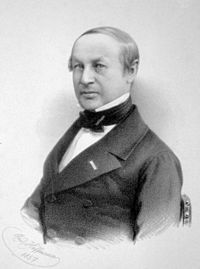Theodor Schwann | |
|---|---|
 Schwann in 1857 | |
| Born | 7 December 1810 |
| Died | 11 January 1882 (aged 71) |
| Education | |
| Known for | |
| Awards | Copley Medal (1845) |
| Scientific career | |
| Fields | Biology |
Theodor Schwann (German pronunciation: [ˈteːodoːɐ̯ ˈʃvan];[1][2] 7 December 1810 – 11 January 1882) was a German physician and physiologist.[3] His most significant contribution to biology is considered to be the extension of cell theory to animals. Other contributions include the discovery of Schwann cells in the peripheral nervous system, the discovery and study of pepsin, the discovery of the organic nature of yeast,[4] and the invention of the term "metabolism".[5]
- ^ Dudenredaktion; Kleiner, Stefan; Knöbl, Ralf (2015) [First published 1962]. Das Aussprachewörterbuch [The Pronunciation Dictionary] (in German) (7th ed.). Berlin: Dudenverlag. pp. 771, 834. ISBN 978-3-411-04067-4.
- ^ Krech, Eva-Maria; Stock, Eberhard; Hirschfeld, Ursula; Anders, Lutz Christian (2009). Deutsches Aussprachewörterbuch [German Pronunciation Dictionary] (in German). Berlin: Walter de Gruyter. pp. 914, 987. ISBN 978-3-11-018202-6. Archived from the original on 22 July 2023. Retrieved 14 December 2020.
- ^ Cite error: The named reference
Chisholmwas invoked but never defined (see the help page). - ^ "Theodor Schwann German physiologist". Encyclopaedia Britannica. Archived from the original on 31 October 2018. Retrieved 31 October 2018.
- ^ Price, Catherine (2018). "Probing the Mysteries of Human Digestion". Distillations. 4 (2): 27–35. Archived from the original on 23 August 2020. Retrieved 30 October 2018.